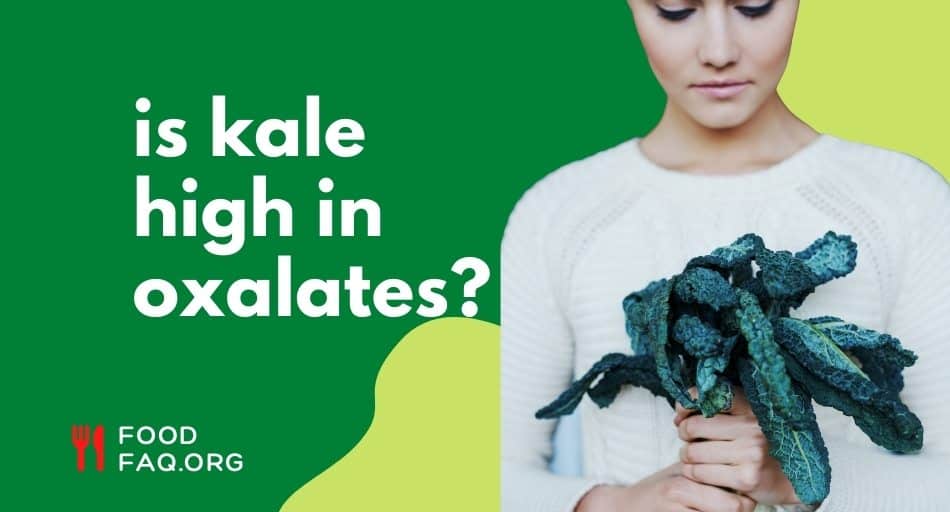Oxalate is a chemical compound present in many foods. When it's consumed, it exits our body through urine. However, some people's kidneys struggle with removing excess oxalates, causing kidney stones and gout. As a result, they may need to consume a low-oxalate diet.

If that's the case, it's important to know the oxalate content of many common foods and the ones that you particularly enjoy eating. For example, is kale high in oxalates?
Kale is a leafy green that's relatively safe to consume on a low-oxalate diet. Leafy green vegetables aren't consumed in large quantities in one sitting, making them very good sources of nutrients, low in oxalates.
Furthermore, kale is a superfood that's packed with nutrients, minerals, and vitamins, so for most people, the benefits outweigh the risks. It's also a great alternative to spinach which is high in oxalates.
Table of Contents
What is the oxalate content of kale?
These days, it's hard to determine the concrete oxalate content of foods. However, an approximate amount of oxalates in a 1-cup serving of chopped kale is 2 mg. Generally, leafy greens are high in oxalates, but we don't consume too many of them in one sitting. Hence, these veggies can be safely incorporated into a diet low in oxalates.
Is kale good for you?
Kale is a superfood rich in many nutrients essential to maintaining proper health. It's also very low in calories, containing only about 33 calories per 1-cup serving. Most of these calories come from carbohydrates, but a good amount comes from protein as well.
Both carbohydrates, especially fiber, and protein help make you feel full after a meal, which prevents weight gain and overeating. Along with the high water content, kale can help you lose weight and flush out all toxins that you have consumed through other foods.
Moreover, kale is high in vitamin A. this micronutrient is important for eye and bone health as well as for maintaining a strong immune system.

On top of that, vitamin A, along with lutein that kale is also rich in, helps protect your eyes from macular degeneration and cataracts. As a result, it's important to stock up on this essential vitamin to keep your eyes healthy for as long as possible.
Another vitamin that kale is rich in is vitamin C, containing over 130% of your daily need for this vitamin in just one serving. Vitamin C is essential for a strong immune system as well as keeping your teeth healthy and preventing scurvy.
This micronutrient is also responsible for preventing chronic illnesses. It's also often included in many skincare products as it helps maintain healthy and glowy skin and protect it from age-related issues.
On top of that, the compounds and substances in kale can help protect you from certain types of cancer. For example, kale contains many antioxidants that help remove free radicals that contribute to cell damage.
Such cell damage can cause a mutation that appears in the form of various cancers. In fact, kale is one of the best leafy greens that can help protect you from developing cancer.
Hence, loading up on this superfood is a wonderful idea, regardless of what dietary plan you follow.
Is boiled kale lower in oxalates?
Boiling kale and other vegetables drastically reduces the oxalate content by 30-87%. This is a much better outcome than steaming and oven-baking.
Therefore, if you want to lower the oxalates content of your favorite foods — especially those high in this compound — boiling is a great way to go about it. Nevertheless, it's important to remember that boiling and any other form of cooking lowers the nutritional content of the food.
As a result, boiling isn't necessary when it comes to kale as it's already low in oxalates.
Is kale smoothie high in oxalates?
Kale smoothies are incredibly popular these days. They are loaded with nutrients and provide a powerful shot of energy, especially if consumed in the morning or right before a workout. However, their ultimate effect on your health depends on the rest of the ingredients you add.
Many fruits and vegetables, such as bananas, spinach, and celery, are high in oxalates. So, if you regularly add these foods to your smoothies, you're increasing the oxalate content of your smoothie.
To combat this problem, many nutritionists recommend steaming or cooking your kale slightly prior to adding it to your smoothie. Furthermore, try choosing low-oxalate foods, such as lettuce, cucumber, or apricots. That way, you can greatly lower the oxalate content of your smoothie and prevent kidney stones from developing.
Can you eat kale every day on a low-oxalate diet?
A diet low in oxalates recommends consuming around 50-100 mg of oxalates per day as compared to the standard 200-300 mg per day. Since just one cup of kale contains only 2 mg of oxalates, it's safe to consume kale every day if you wish to do so.
However, remember to maintain a balanced diet that's rich in all nutrients and vitamins as that's the only way to stay healthy. Furthermore, eating a well-balanced diet helps prevent the development of kidney stones even more.
However, kale does come with an oxalate content that can, in the long run, cause serious health issues. As a result, if you wish to consume kale regularly, it's best to steam or boil it. This will reduce the oxalate content and help keep the kale as healthy as possible.
This is because a too high oxalate content can disrupt thyroid function, leading to many diseases that can be very dangerous.
Kale is a leafy green low in oxalates, making it a perfect addition to a healthy, balanced diet. It's a superfood loaded with nutrients, minerals, and vitamins, and it helps you stay as healthy as possible. In addition, due to its low oxalates content, it can be safely consumed on a diet low in oxalates without causing any adverse health effects.
As with everything, though, make sure to practice moderation and include all food groups in your daily diet.
